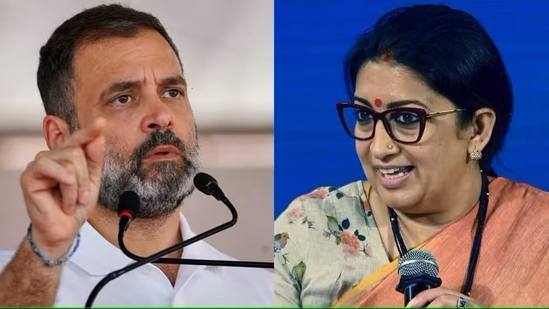Smriti Irani calls Rahul Gandhi ‘frustrated dynast’ over PM Modi tweet; Congress reacts: ‘Keeps mum on…’
Rahul Gandhi hit out at Narendra Modi over the situation in Manipur and European Parliament discussing it, saying he has not uttered a word on either of these.
Rahul Gandhi's criticism of Prime Minister Narendra Modi on Saturday over his “silence” on the Manipur violence has triggered a war of words between the Bharatiya Janata Party and the Congress, with Smriti Irani calling him a “frustrated dynast”, while Congress spokesperson Supriya Shrinate hitting back at the Union minister with “a frustrated soul” jibe.

Criticising Modi over the Manipur violence, Gandhi had tweeted, "Manipur burns. EU Parliament discusses India’s internal matter. PM hasn’t said a word on either! Meanwhile, Rafale gets him a ticket to the Bastille Day Parade."
Hitting back, Irani accused Gandhi of seeking international intervention in India’s internal matters. "…a frustrated dynast who sullies the ‘Make in India’ ambition mocks India when our PM receives a National honour," Irani tweeted.
Further, taking a jibe at Gandhi, she added, “Rejected by people, he seethes as defence contracts no longer land at the doorstep of dynasty.”
Irani's words did go down well with the Congress's Shrinate, who was quick to criticise the minister for allegedly keeping “mum on sexual exploitation of our athletes”.
“A woman who doesn’t speak a word on atrocities against other women, who keeps mum on sexual exploitation of our athletes, who is conspicuously silent on back breaking high prices, a frustrated soul whose only relevance is to spew venom against Rahul Gandhi,” the Congress leader tweeted.
“Sidelined in her own party, desperate for eyeballs and relevance - you revel in your silly soul Smriti Irani. I also suggest see a doc, this level of hatred is corrosive and self damaging,” she added.
Earlier, BJP IT-cell head Amit Malviya accused Gandhi of leaning "on foreign powers, from America to Europe, to settle domestic political scores”, over the latter's tweet on Modi.
“It can’t be a mere coincidence that EU Parliament proposed to debate the conflict in Manipur, which it has no business venturing into, soon after Rahul Gandhi visits the state. Lets look at the sequence of events. Rahul Gandhi goes to London and seeks foreign intervention in India’s internal matters. Then he politicises the unfortunate conflict in Manipur, which is completely a legacy of the Congress, visits Manipur and next we see a foreign power wanting to sit in judgment on an issue, that is internal to India. Interestingly, EU Parliament didn’t hold any debate or discussion on the recent riots in France," Malviya tweeted.
“It is quite obvious that Rahul Gandhi is leaning on foreign powers, from America to Europe, to settle domestic political scores. He is openly, brazenly and willingly collaborating with global syndicates, that are working to undermine India’s strategic and geopolitical interests,” he added.
MEA slams European Parliament's resolution on Manipur
Gandhi's tweet comes days after the Ministry of External Affairs slammed the European Parliament for adopting a resolution on the situation in Manipur, terming it 'unacceptable'. MEA official spokesperson Arindam Bagchi said such interference in India's affairs reflects a "colonial mindset".
Arindam Bagchi said that Indian authorities at all levels, including the judiciary are aware of the situation in Manipur and are taking measures to maintain peace, harmony, law and order.
on July 12, foreign secretary Vinay Kwatra in a press briefing said that EU parliamentarians are being reached out and it has been made clear to them that it is a matter “absolutely internal to India”.
Manipur violence
Manipur has been witnessing violence since May following the protests by the Kuki and Naga communities against the high court's order asking the state government to consider the inclusion of the Meitei community in the category of Scheduled Tribes (ST). Only STs can buy lands in hilly areas.
The majority Meitei community, which occupies the Imphal valley and nearby areas, sought the ST status keeping in view their increasing population and increased requirement of land so that they could purchase lands in the hilly areas.






